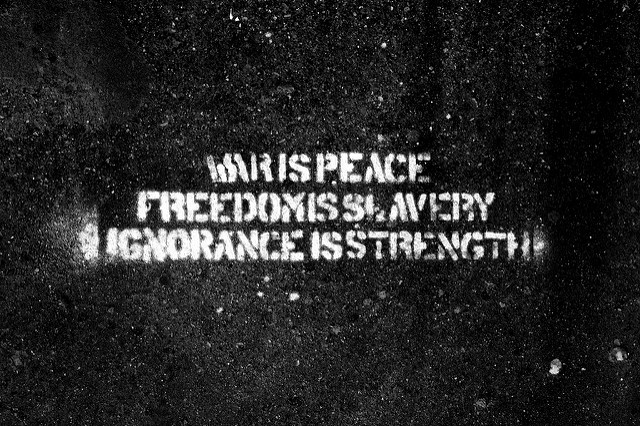
The heat of the Oz new year is here, heralding our annual Madeleine Award for the use of symbol, stunt, prop, gesture or jest.
The envelopes, please, for the 9th awards ceremony, named to honour former US secretary of state Madeleine Albright for sending diplomatic messages via the brooches worn on her left lapel. Albright messaging wasn’t about ‘read my lips’, it was ‘read my pins’: her favourite mistake was wearing a trio of monkey brooches to meet Vladimir Putin, causing the Russian to go ape.
In just such a spirit, Australia’s foreign minister Julie Bishop nearly won the 7th Madeleine Award for answering questions using only emoji characters. Just as Albright monkeyed Putin, Bishop’s least diplomatic response was replying to a Putin question with a red-faced angry-man emoji.
The first of the minor awards is the Diana Directive on the Utility and Force of Photographs and Images. The title comes via Tony Blair, who cited the Princess of Wales: ‘As Diana used to say, the picture is what counts.’
Blair’s biography recounts Diana’s understanding, both emotional and analytical, of the demands of the media age:
I had a conversation with her once about the utility and force of photographs and how they could be best used, which showed a mind that was not only intuitive but also had a really good process of reasoning. She had the thing totally worked out. Occasionally she would phone and say such-and-such a picture was rubbish or what could be done better, and though not, as I say, at all party political, she had a complete sense of what we were trying to achieve and why. I always used to say to Alastair [Blair’s PR supremo]: if she were ever in politics, even Clinton would have to watch out.
A fine example of the picture directive was Donald Trump placing his hands on a glowing orb in Saudi Arabia. That’s the sort of image advance teams crave. Governments around the world took note: captivate the US president with colour, movement and bright stuff that feels important.
As politics is show business for ugly people, the Diana Directive mandates fashion shoots for pols in suits. So the official portrait of French president Emmanuel Macron went through 91 Photoshop tweaks—the location, pose and props of the picture offer ‘a masterclass in soft-power symbolism’.
Broadening our understanding of the directive, the Diana award this year goes to a picture that didn’t happen. Ahead of delivering the British budget, Chancellor Phillip Hammond planned to take a trip in one of the driverless cars he wants to see on UK roads by 2021. Downing Street and the Treasury cancelled the photo-op, killing the image of a chancellor who didn’t have his hands on the wheel in a driverless government.
Next, our little-sort OOPS! Award, celebrating an I-wish-I-hadn’t-said-that blunder. The headshaking ruefulness of the OOPS! was captured long ago by the Tory MP Boris Johnson after a political smash-up: ‘There are no disasters, only opportunities. And, indeed, opportunities for fresh disasters.’ The gleeful side of the OOPS! was epitomised when Prime Minister Tony Abbott won for announcing that he wasn’t ‘the suppository of all wisdom’.
The disaster dimension of the OOPS! is to the fore with this year’s winner: United Airlines CEO Oscar Munoz apologising for having to ‘re-accommodate’ a passenger who was hospitalised after being dragged bloody and screaming from his assigned seat on an overbooked flight. Passenger videos went viral and ‘re-accommodate’ was dubbed ‘possibly the worst bit of crisis-PR in history’. OOPS!
Next, the George Orwell Prize for Doublethink and Euphemism (North Korea is barred from this category—otherwise, it’d monopolise the prize). When Donald Trump was sworn in as Big Brother, Orwell’s 1984 was quickly back on the bestseller lists. Following Ministry of Truth guidelines, the new administration is banning words it doesn’t want bureaucrats to use: ‘vulnerable’, ‘entitlement’, ‘diversity’, ‘transgender’, ‘fetus’, ‘evidence-based’ and ‘science-based’. Newspeak lives.
Now the biggie, the 9th Madeleine Award. An honourable mention goes to Australia’s foreign affairs department for renaming some rooms in its HQ. When the original naming happened three decades ago, lots of big rooms were named after important blokes in Oz foreign policy (Arthur Tange, Gareth Evans), and when they ran out of blokes, another eight smaller meeting rooms were named after flowers and plants. What’s missing from that picture?
A Madeleine salute to Australia’s first female foreign minister and first female foreign affairs secretary for renaming those eight rooms after significant women in Oz foreign affairs history. As Albright always argues, getting more women into the room makes for better decisions, although there’s a typically dry Madeleine caveat: ‘If you think the world would be better if it were fully run by women, you’ve not gone to high school.’
In the era of Trump-eting, this year’s winner was obvious. We are in the ‘post-truth’ period (Oxford Dictionaries picked post-truth as the 2016 word of the year). We are in the time of truthiness, a festival of feelpinion. Anything The Donald doesn’t like in the media is denounced as fake news.
The spirit of the new age was unveiled back in January 2017, when Trump’s counsellor Kellyanne Conway gave the world the concept of ‘alternative facts’.
The alternative universe of alternative facts wins the 9th Madeleine.

